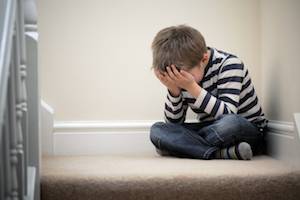When Can Parental Responsibility be Allocated to One Parent?
 In most circumstances, it is in the best interests of a child’s parents to share the allocation of parental responsibility (formerly known as child custody) following divorce. This is a “two hands are better than one” philosophy, with former spouses, even after divorce, working to share resources and balance work and family responsibilities in a way that supports the child’s education, health, and well-being every bit as much as if the parents were still married and living together.
In most circumstances, it is in the best interests of a child’s parents to share the allocation of parental responsibility (formerly known as child custody) following divorce. This is a “two hands are better than one” philosophy, with former spouses, even after divorce, working to share resources and balance work and family responsibilities in a way that supports the child’s education, health, and well-being every bit as much as if the parents were still married and living together.
Parental responsibility is typically shared when a divorce is as harmonious as can be expected, with parents collaborating to create a parenting plan in compliance with state law, and sometimes even when a divorce is filled with acrimony and collaboration is difficult. There are, however, some circumstances in which it is in the best interests of the child for parental responsibility to be solely allocated to one parent.
A History of Violence, Abuse, or Neglect Is Relevant to Child Custody
With the “best interests of the child” being paramount in the allocation of parental responsibility, it is important to identify certain behaviors that are not in the best interests of the child. Among these behaviors – all factors at issue in a …
The Rights of a Stay-At-Home Parent in an Illinois Divorce
 Divorce can bring unique stress and uncertainty for people who have chosen to assume the valuable role of stay-at-home parent. If you are such a person, you know all too well the worrisome thoughts that hover. How am I going to earn money and be there for my children? Can I even start a career now? How is it fair that my ex-spouse is leaving the marriage with their career intact, while I am entering the job market for the first time?
Divorce can bring unique stress and uncertainty for people who have chosen to assume the valuable role of stay-at-home parent. If you are such a person, you know all too well the worrisome thoughts that hover. How am I going to earn money and be there for my children? Can I even start a career now? How is it fair that my ex-spouse is leaving the marriage with their career intact, while I am entering the job market for the first time?
Each of these concerns is both legitimate and commonplace. Fortunately, Illinois state law (which governs divorce, child support, and spousal support) acknowledges and respects the trade-offs and sacrifices in marriages in which one spouse assumes the role of income earner and the other the role of stay-at-home parent.
Equitable Property Division for the Stay-At-Home Parent
Just because one spouse earned the majority of the income during a marriage, that does not mean that he or she is entitled to all or most of the marital property. Illinois recognizes that stay-at-home parenting is in itself a valuable contribution, representing both a benefit to the well-being of children and a sacrifice of career opportunities.
This contribution is not unlike …
Creating an Illinois Parenting Plan That Fits Busy Holiday Schedules
 If you have children and are recently divorced or are in the middle of the divorce process, issues related to parental responsibility and parenting time may be a significant source of stress right now. The reason: the holidays. As parents coordinate time family and friends, plan holiday activities, and determine schedules while kids are home from school during their winter break, a fair and reasonable allocation of parental responsibilities is imperative.
If you have children and are recently divorced or are in the middle of the divorce process, issues related to parental responsibility and parenting time may be a significant source of stress right now. The reason: the holidays. As parents coordinate time family and friends, plan holiday activities, and determine schedules while kids are home from school during their winter break, a fair and reasonable allocation of parental responsibilities is imperative.
Illinois Law Requires a Parenting Plan
No matter whether you have an amicable or contentious relationship with your ex-spouse or ex-partner, when it comes to the allocation of parental responsibilities, you are bound by Illinois law to obtain a court-ordered parenting plan. With a well-crafted and drafted parenting plan, each parent and the state of Illinois will have total clarity as to the legal rights and obligations of both parents as concerns their children.
Decision Making and Parenting Time Are the Cornerstones of a Parenting Plan
The legal rights and obligations allocated to each parent in an Illinois parenting plan cover two major areas: 1) decision-making responsibility, and 2) parenting time (sometimes termed “visitation”). In other words, a parenting plan concerns all of the important things that go together …
Understanding the Legal Question of a Parent’s Fitness to Raise a Child
 When a divorce is contentious and can only be resolved through litigation rather than mediation, allegations concerning a parent’s “fitness” to raise a child can often be a flash point. “You are not fit to raise our child” are words that cut deep and may turn an already hostile process into the most bitter of contests. If you believe that your ex-spouse is unfit to raise your child, know that parental fitness is a legal question. In other words, you cannot unilaterally decide that your ex-spouse is unfit as a parent. Lack of fitness is a multi-factor inquiry that is considered formally and has important legal ramifications.
When a divorce is contentious and can only be resolved through litigation rather than mediation, allegations concerning a parent’s “fitness” to raise a child can often be a flash point. “You are not fit to raise our child” are words that cut deep and may turn an already hostile process into the most bitter of contests. If you believe that your ex-spouse is unfit to raise your child, know that parental fitness is a legal question. In other words, you cannot unilaterally decide that your ex-spouse is unfit as a parent. Lack of fitness is a multi-factor inquiry that is considered formally and has important legal ramifications.
Illinois Law Provides Criteria By Which to Establish If a Parent Is Unfit
On the ground in the real world, there are words that speak clearly to a lack of parental fitness: abuse, addiction, incarceration, and psychological instability, to name but a few. These blights on the welfare of a child are the true metrics by which the state of Illinois evaluates whether one or both parents of a child are legally unfit to have parental responsibility for their child. Here, the toughest of questions are asked:
- Does the parent have






